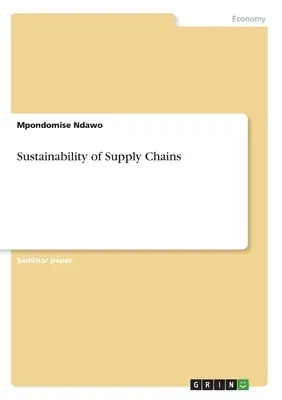Seminar paper from the year 2016 in the subject Business economics -
Business Management, Corporate Governance, grade: 91, University of
South Africa (School of business and leadership), course: Master
Business Leadership, language: English, abstract: Supply chain
management is the integration and management of a complex network of
activities involved in delivering a complete product to the end-user or
customer. It is a common belief that all stages in a product life cycle
will have an impact on supply chain biodiversity burden, from resource
extraction, manufacturing, use and reuse, final recycling. This is based
on the fact that the environmental agenda has become increasingly
important for the Government of South Africa, and is slowly reflected in
growing legislation to counter negative impacts on the environment. The
government's primary targets are the building, construction, and water
sector; there is a belief for considerable scope for improvements. There
are concerns with regards to the environment and this has led the
government to also include sustainability, this covers ecology,
economic, social and cultural considerations from a South African
perspective. Rand Water as a state-owned enterprise has realised the
importance of sustainability issues by formulating, evaluating and
verifying relevant environmental requirements in its supply chain policy
for the development of its current and future products. New tenders
before being issued to the market, a list of requirements are stipulated
in a way that enables them to be fulfilled by the service providers and
verified by Rand Water officials on submission. Rand Water is busy
conducting ways to modify its project management practices to be
environmentally friendly as they continue in its quest for
sustainability compliance. The proposed route towards dematerialized and
detoxified goods and operations can be summarized by the four R‟s:
Reduce, Repair, Reuse, and Recycle.


